#Gerard Bonneville
Text
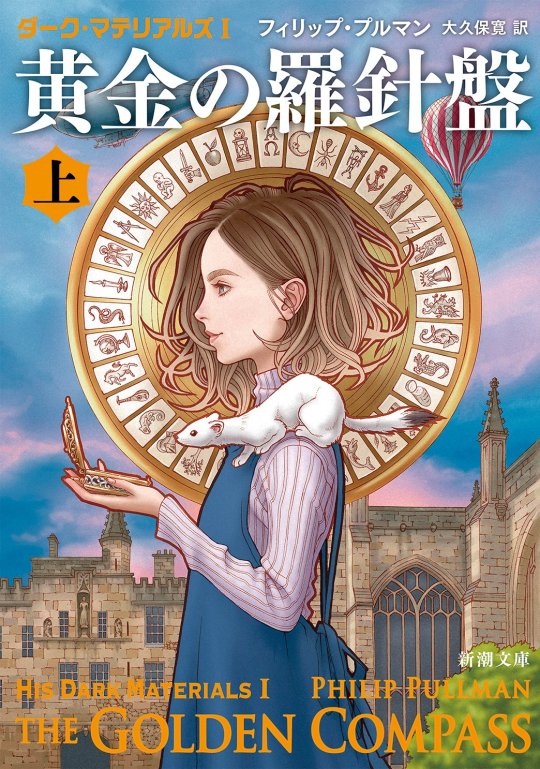
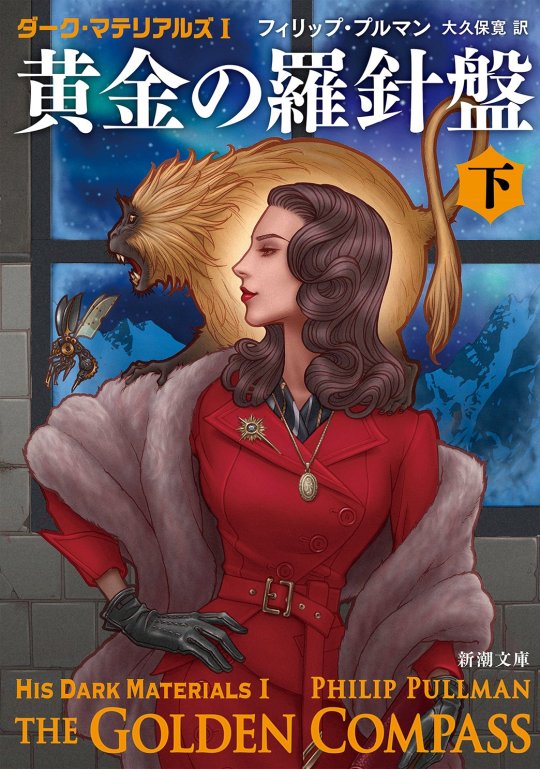

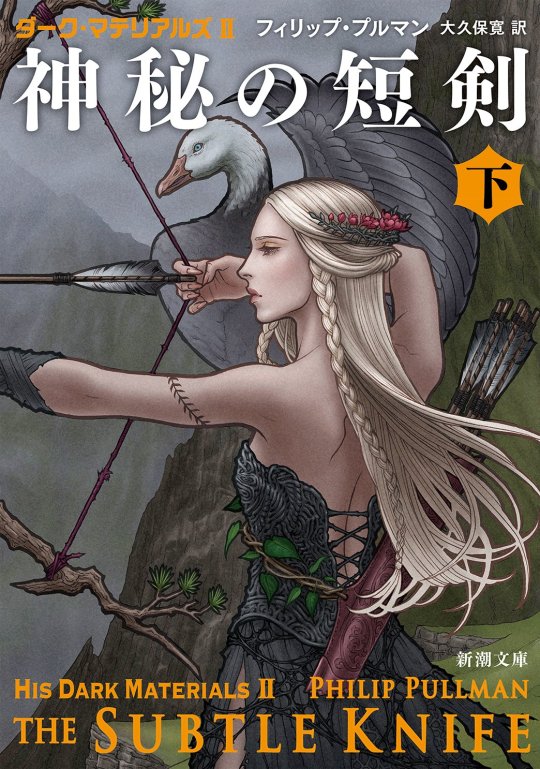
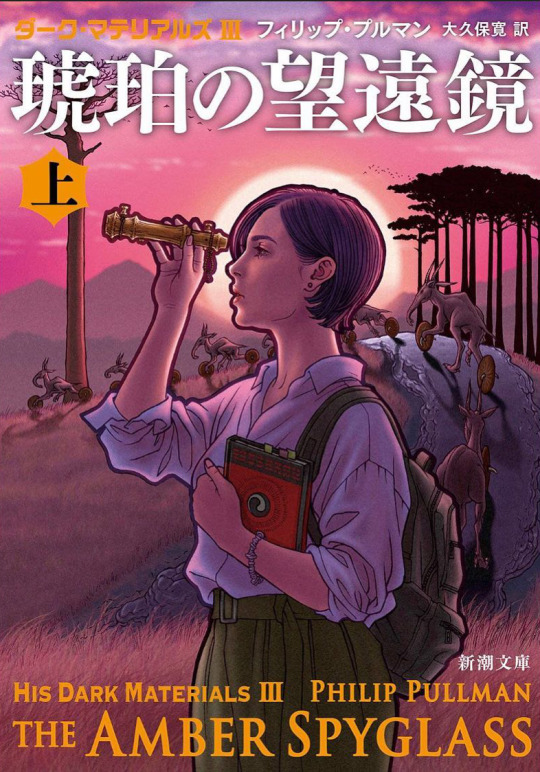
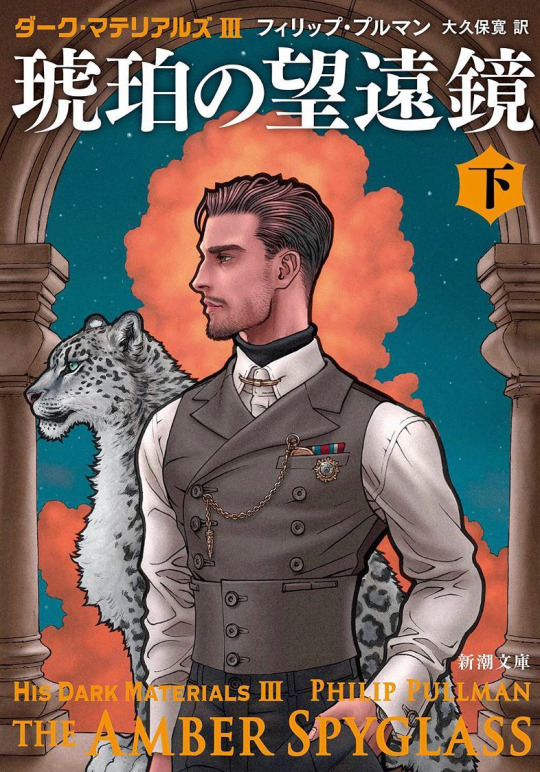

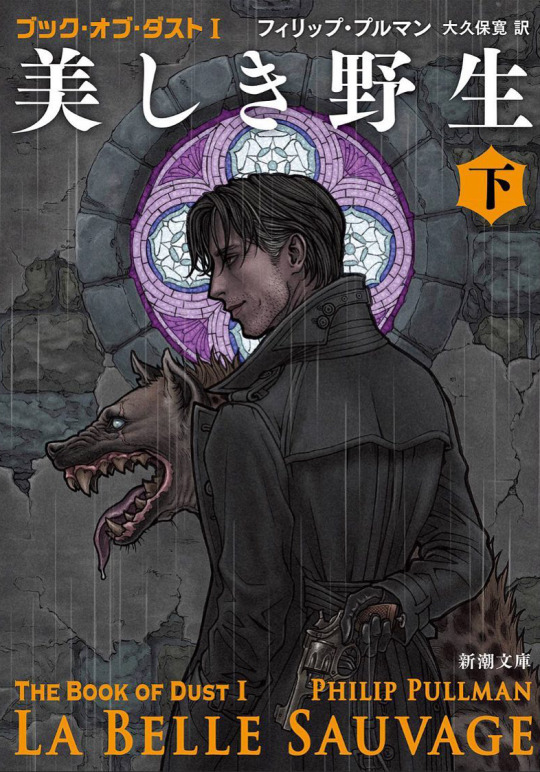
'The Golden Compass', 'The Subtle Knife', The Amber Spyglass' & 'La Belle Sauvage' by Takumi.
Cover art for the Japanese editions of the 'His Dark Materials' trilogy, and book 1 of 'The Book Of Dust' trilogy written by Philip Pullman.
#Art#Takumi#His Dark Materials#The Golden Compass#The Subtle Knife#The Amber Spyglass#The Book Of Dust#La Belle Sauvage#Lyra Belacqua#Lyra Silver Tongue#Mrs Coulter#Will Parry#Serafina Pekkala#Mary Malone#Lord Asriel#Malcolm Polstead#Gerard Bonneville#Books#Book Cover#Cover Art#Japan#Japanese
426 notes
·
View notes
Text

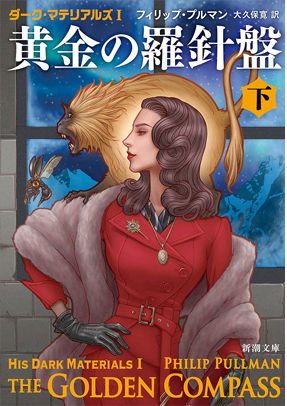

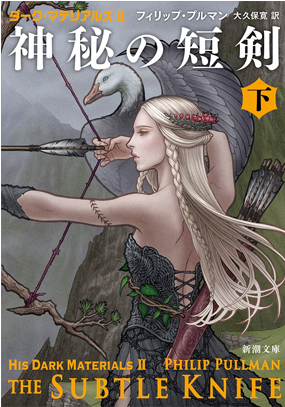




Japanese paperback covers of His Dark Materials and La Belle Sauvage
Source
#his dark materials#hdm#cover art#japanese covers#northern lights#the golden compass#the subtle knife#the amber spyglass#the book of dust#la belle sauvage#lyra belacqua#marisa coulter#will parry#serafina pekkala#mary malone#asriel belacqua#malcolm polstead#gerard bonneville#the hyena looks rabid#fun fact: hyenas are most closely related to meerkats and mongoose#m#🌌🌌🌌
295 notes
·
View notes
Text
Nugent: “There are other scholars working on Dust. Asriel’s taken an interest, and Marisa Coulter—“
Bonneville: “That moist whore’s a fine one to be swanning about symposiums on experimental theology. Talking so brilliantly about scholastic purity, while fornicating with Asriel on every flat surface in the scientific institute!”
I am REELING AT THIS INTERACTION
#I know she’s the reason he was in jail#but like DAMN 💀💀#his dark materials#la belle sauvage#la belle sauvage play#marisa coulter#lord asriel#marisa x asriel#masriel#Gerard bonneville
64 notes
·
View notes
Text
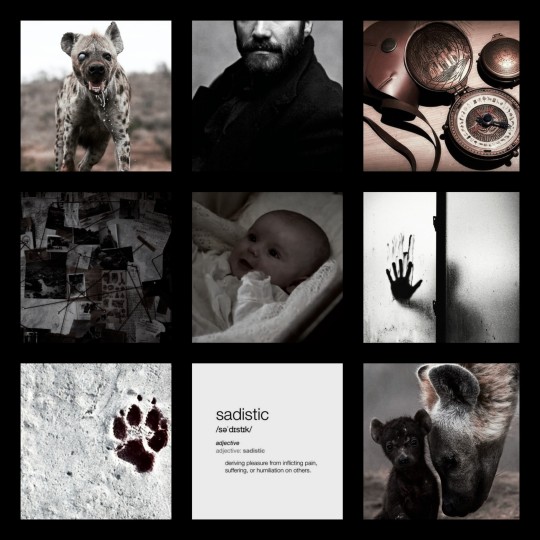
Gerard Bonneville moodboard
#hdm bbc#his dark materials moodboard#his dark materials#moodboard#la belle sauvage#gerard bonneville
10 notes
·
View notes
Text
Consider this:
If Will and Olivier are similar enough that Lyra mistakes one for the other at one point;
And Will is said to look a lot like John Parry;
And Olivier is said to look a lot like Gerard Bonneville;
Does this mean that Bonneville and John Parry are actually quite similar?
#his dark materials#the book of dust#gerard bonneville#john parry#I've been pondering about this for a while LOL#philman lost the opportunity to make them the same person that would have been hilarious
3 notes
·
View notes
Text
a thought that's occurred to me, my portrayal of marisa has very much changed and evolved from when I've first started writing her. with the secret commonwealth, the collectors, the la belle sauvage play and especially the bbc adaptation of his dark materials coming out, all of these coming out after I've started playing marisa first in 2008. (not here, I've written marisa on several different platforms before tumblr, I've only been writing her here since 2016) but yeah it's strange sometimes to think about how differently I write her now.
but at the same time, with all of this now canon media that's been released about her, as well as my own headcanons changing and adapting to this new canon information, of course my adaptation is going to change and evolve. now I can't definitively say that it's for the better or the worse but it has definitely changed, and I still try to be as respectful to her canon as possible while also taking her in directions that I feel make sense for her character.
ted talk about marisa and my characterization of her below:
while yes she is a definite blend of all canon media of her, I have to admit that she's made up of a lot of the bbc adaptation. I know that in some circles that portrayal of marisa is controversial because it makes her "softer" and "more humanized" and I kinda agree but I also don't necessarily see that as a bad thing. but then again I've always preferred villains that are more multifaceted than just, they're straight up evil. and even in the original trilogy, my personal belief is that it was never the case with marisa then either.
in the golden compass/northern lights, we see marisa almost exclusively through lyra's eyes and we only see her for a few chapters. imo she is built up as someone purely evil for the sake of the narrative. we start to see cracks in this as we start to see more of her perspective in the subtle knife, but we also learn more about her motives, even if only in snippets. though we don't get the full character depth we know her most for until the amber spyglass, which is when we really start seeing things from marisa's perspective, seeing previous events from her perspective, and seeing her actually grow and change as a person. from everything we learned about her character in the amber spyglass, and including that line from mary "words like good and evil describe actions, not people" that's not the exact quote but that's what she says in less words, I think it was pullman's intention to express that marisa, as well as many other characters in his books, aren't entirely evil and aren't entirely good, and even not evil or good. that they're just people. but he seems to show us in great detail that this is especially the case of marisa.
she does so many both evil and good actions throughout the trilogy, as well as so many both evil and good intentions and motivations throughout the trilogy. I don't think making marisa out as dehumanized and purely evil was ever pullman's intention. for me I see further proof of this when we got la belle sauvage, when we learn of marisa being sa'd in her youth, of the usually fearless marisa being so physically terrified at being told that gerard bonneville was looking for her, when we got the secret commonwealth where we see that marisa had an absolutely fucking horrible mother, and no we don't know all the details of these things, but the pieces are there. another element that I feel is proof of this is that pullman has been both incredibly supportive of the bbc adaptation, as well as heavily involved in its creation. he's credited as an executive producer, a lot of things went through him for approval. also, pullman has said time and time again that his favorite character of this series is marisa coulter. I truly don't think he would approve of the way she's portrayed in the series if he didn't actually see it as her, if he agreed with some of the sentiments saying that the adaptation "ruins her character by humanizing her".
honestly I feel like the bbc adaptation gave marisa the depth that pullman wanted to give, but at the time was focused more on the main narratives in the first two books, but then we got to the amber spyglass, where so much of the novel is focused on giving marisa that same level of depth and, yes, humanization. honestly the bbc adaptation to me feels like an extension of that depth shown in the amber spyglass, and it's one that clearly pullman is approving of.
the other thing I've seen is the complaint that because she's so humanized in the bbc adaptation, it belittles and erases what evil actions she has done. I disagree. I personally have seen with most people who do these evil actions, realistically, that person usually does think that they're doing the right thing, that they are acting with what they see are good intentions, that they have reasoning for why they're doing what they're doing, and of course that doesn't make any of their actions okay.
what does, however, make their actions at least possible to forgive, is character growth. learning from mistakes, changing ways, doing better, which is what we see marisa doing in the amber spyglass. though another argument I see is that, it says in the amber spyglass that marisa is remorseless but in the bbc adaptation, we see marisa showing remorse, and to that I argue; those times in the book, that is said/thought about her, by other people. they believe her to be remorseless. from what I can think of, we never truly get a statement either spoken or thought by marisa herself that she truly doesn't feel remorse for her actions. we get asriel's inner thoughts, will's inner thoughts and I think at some point lyra's inner thoughts about how she doesn't feel any sort of guilt or remorse, but never marisa's own.
I would argue that we also see her showing remorse in the amber spyglass. her thinking about her crimes, her saying how awful her crimes were, which is not something she did in the first book. she never would've called them crimes, she called them her saving humanity, her trying to do good. but in the amber spyglass, she specifically calls those same actions crimes. I just don't think a completely remorseless person would express the way she did about how truly horrible her actions were. she also audibly lamented her mistakes with lyra, even as far back as saying that she and asriel should've raised lyra themselves.
in the scene that is usually the biggest argument of marisa being this truly evil, remorseless person, is the scene where metatron is examining marisa, where he tells her about every horrible thing she's ever done, how horrible of a person she is, etc. we also see both in marisa's inner thoughts and in her aloud dialogue to asriel that marisa was actively trying to convince metatron that there wasn't a shred of good in her, for the purpose of her being able to trick him into thinking she was evil enough to be able to betray her child and her lover. that's the key here. she was internally doing her absolute best to shove down any shred of goodness she had, any amount of remorse, her love for lyra, her love for asriel. and surprisingly what a lot of people leave out when talking about that scene, is moments later, metatron literally sensing regret from marisa. he tells her that it's regret that she would never get to see lyra grow up, and ofc she lies her way out of it and claims its regret about not meeting him earlier in her life, which he accepts. which, personally, I feel like if he knew the reason behind her regret as a fact, he wouldn't have. so my guess? he was deciphering why she felt regret and that's what made the most sense, but he had enough doubt in this to believe marisa's lie about the actual reason.
so honestly I feel that could mean that this regret could extend to a lot of things, definitely with lyra, but I could argue that her regret was encompassing the fact that she did do all of those things that metatron said, she was that way before, and does feel regret and guilt for it. and honestly I think she came to feel that way through loving lyra, through seeing and learning from her, from lyra pointing out the flaws in her previous logic, from lyra telling her about how awful her actions were, lyra being this beautiful human being that marisa herself defends as someone brave, generous and loving. and I think that really had an effect on marisa, making her want to be better, to be more like lyra, which I think we see is definitely true in the bbc adaptation, or if nothing else, at least making her feel remorse and guilt for all of the things she's done. I think we see that in the amber spyglass, I really do.
I mean it was the amber spyglass that completely changed my opinion on marisa as a character. believe it or not, when I first read the golden compass, and then first read the subtle knife, I didn't trust marisa, I didn't like her, I thought she was cool and mysterious but I absolutely saw her as this wicked, evil bitch. and then I read the amber spyglass, and there was a change of perspective, I went through ups and downs of wondering if I could trust her, wondering if she was being sincere, and it actually turned out that she was. that she was genuinely so loving of lyra, genuinely going through character development, and also so many actions and statements here put previous actions and statements into a different perspective for me. I went from rooting against marisa to rooting for her, to emphasizing with her, to seeing her as, yes, humanized. the amber spyglass did that first, not the bbc adaptation. the bbc adaptation took that humanization and expanded upon it, showing her perspective and scenes that we didn't see in the golden compass and the subtle knife but ones that absolutely make sense for her character.
another argument I saw was that marisa being portrayed as a woman being oppressed by a sexist society is an invention by the bbc adaptation to further humanize marisa, to which I'm just like ????? go read the books again honestly. the first book especially talks about how big of a deal it was that marisa was the first ever woman accepted as a member of the royal arctic institute, and an even bigger deal that she was the first woman accepted as a member of the magisterium. in the original trilogy, we only ever see women in england as nurses, nuns, or any other non male dominant field besides scholars (who are only allowed to be so at st. sophia's college for women) and the one female reporter. and it's such a big deal that marisa is accepted into the magisterium as an actual member vs being in it as a nun or a nurse is because the magisterium time and time again is shown to view women as generally lesser. the golden compass also talks about how marisa's affair went down, how it was even a question of whether or not asriel had committed murder or self defense when marisa's husband aimed to kill asriel and their child, the court's argument of why asriel should be charged for murder instead of self defense was legitimately "edward had the right to defend the violation of his wife" despite marisa's relationship with asriel being consensual, because they legit don't see wives as autonomous people, they saw marisa as property of edward, that he apparently had every right to defend by possibly murdering her lover and their child. and that's just the first book. we see so many more examples of patriarchy and marisa (as well as other female characters in the series) being subjected to it throughout the entire trilogy. so to the person who said the bbc adaptation just made that shit up. yeah no, I'm saying with my full chest that you're wrong.
so idk yeah. my adaptation of marisa does feel regret, she does have the self hatred that we see her experiencing in the bbc adaptation, this self hatred being based on a scene we actually got in the movie that pullman has stated that he loves and approves of this scene of marisa striking her daemon as a means of self punishment and says makes absolute sense for her character, combined with it being based on another scene we get from the golden compass novel, (and honestly, we see her experiencing this same self hatred in the amber spyglass as well), she does have genuine love for lyra which we see time and time again in the original trilogy, from in the golden compass marisa putting her own ass on the line by taking lyra in, and then later saving lyra from the intercision machine, to the subtle knife where she goes through such lengths to find and save lyra, to the amber spyglass, where she gives up literally everything she's ever worked for in order to save lyra, even including sacrificing her life to save her, and yes, she does try being a better person starting from, what I feel is mid to late the golden compass after failing so hard with lyra and regretting it. I know some people disagree with this kind of portrayal of marisa, not because anyone personally told me this, although I'm kinda surprised I haven't gotten anons about it or anything, I've just seen people talking about how they think the bbc adaptation is insulting to her original canon, and I just really disagree with that. I think everything I've described here does have a canon basis in pullman's books, both the original trilogy and the side books featuring marisa, and my opinion is further cemented to me by philip pullman himself approving of the bbc adaptation.
3 notes
·
View notes
Text
Thoughts On Spotted Hyena Daemons and Layers of Symbolism in Daemon Species
I think spotted hyenas are fascinating animals for a lot of reasons, which is partly why I am also fascinated with Gerard Bonneville, whose daemon has the form of a spotted hyena.
A few observed behaviors of spotted hyenas make it clear why they may have a bad reputation and why Bonneville's daemon's form is suitable for him: females are socially dominant and vicious, they don't form pair bonds, and they have been observed to be deceptive.
But like symbols of the alethiometer, daemons can have multiple layers of symbolism, and even if the top layer of symbolism is that of a carrion-eating, pack-hunting predator, we can dig deeper and get something more complicated.
I wrote the explicit fanfic "Something in Common" (do not click if you're not an adult, please just block me and move on) in part because I wanted to create an original character with a spotted hyena daemon who could be the opposite of Bonneville while having the same daemon.
In this case I took some of the less violent traits that spotted hyenas display which are nevertheless interesting and ran with those: spotted hyenas inherit social rank from their mother, their problem-solving skills in groups rivals that of some primates, and they are highly adaptive. There is a city in Ethiopia where spotted hyenas have been eating city refuse and accepting food from residents for hundreds of years and have become less dangerous to humans as a result.
I built my character Esther with these traits in mind. Esther has a lot in life as a result of generational wealth but little power of her own. She's gregarious and does well in groups, looking for new things to try and people to meet. Her daemon Sotirios is a male and to reflect the idea that male spotted hyenas are picked on by females, I wanted him and Esther to be agreeable to a fault much of the time.
My big point is: look for layers in the daemon symbolism. Have fun making characters with daemons of the same species who are wildly different.
23 notes
·
View notes
Text
The chapter “The Mausoleum” is difficult for me to read in the same way that The Bell Jar by Sylvia Plath is difficult for me to read--because it so accurately describes the feeling of depression, indeed with its hallmarks: “And everything was saturated, whether with rain or dew or the remains of the flood; everything he touched was heavy and soaked and rotten. His heart was just like that. He would never manage to light any of it” (416).
But Malcolm and Asta resolve that they will not burn any of Bonneville’s notes, knowing that he is a Rusakov scientist on the verge of a breakthrough. They will not destroy the knowledge they have.
I grow concerned that what enables Bonneville to “shadow”/haunt them is the fact that Malcolm is carrying the research.
#philip pullman#the book of dust#la belle sauvage#la belle sauvage spoilers#sylvia plath#the bell jar#malcolm polstead#asta#gerard bonneville
15 notes
·
View notes
Text
TWO FANCAST LAYOUTS
Mark Waschke as Gerard Bonneville -fan casting- in La Belle Sauvage (Phillip Pullman, 2017).
Please, reblog + like if you use it or give me credits on twitter @IMSYLWANIN .
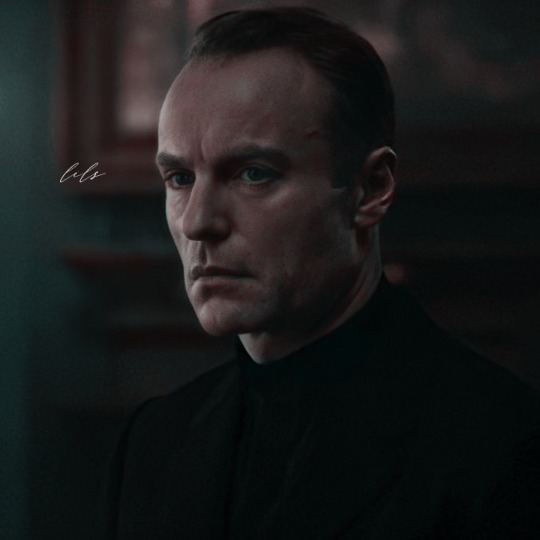

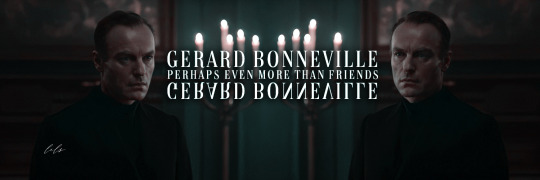

#gerard bonneville#twitter layouts#roleplay#mark waschke#phillip pullman#la belle sauvage#fan cast#mark waschke icons#gerard bonneville icons#psd
6 notes
·
View notes
Text

From the Mausoleum chapter. Malcolm saving Alice from de Bonneville.
#the book of dust#la belle sauvage#malcolm polstead#philip pullman#alice lonsdale#gerard bonneville#hyena
9 notes
·
View notes
Photo
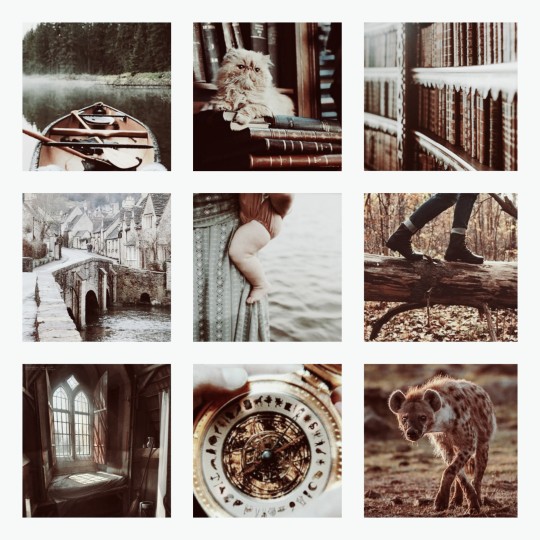
❍ ; Lᴀ Bᴇʟʟᴇ Sᴀᴜᴠᴀɢᴇ
#LaBelleSauvage#La Belle Sauvage#TheBookOfDust#the book of dust#malcolm polstead#alice parslow#gerard bonneville#lyra belacqua#lyra silvertongue#his dark materials#TBoD#HDM#aesthetic
84 notes
·
View notes
Note
I had come across some spoilers for La Belle Sauvage, and had mixed thoughts about reading it, but hearing that Mrs Coulter is treated awfully in the book makes me really reluctant to read it. I would be very interested to hear more of your thoughts on Mrs Coulter in the book and how Ruth Wilson and Jack Throne's interpretation of the character relates to the information from the book.
I can’t answer this without spoilers, so don’t read farther if you’d rather be surprised.
Well, in La Belle Sauvage Mrs.Coulter is pursuing her daughter, much like she is in the TV show. She’s using alethiometers too, and she learns just a bit about the prophecy from an alethiometer. For whatever reason, all of the characters assume that she is only interested in Lyra because of the prophecy, and they also assume that she wouldn’t be a good mother. Malcolm knows where Lyra is but intentionally keeps Mrs. Coulter from finding her. It was really frustrating to read after having read The Amber Spyglass. Knowing what happens at the end of the series makes it hard to relate to the characters who are trying to keep Lyra away from Mrs. Coulter. The possibility that Mrs. Coulter spent 12 years trying to find a way to get Lyra is just super upsetting to me.
The dialogue written for Mrs. Coulter is very on point in the TV show. For example, in La Belle Sauvage Malcolm asks Mrs. Coulter if she’s a scholar and she replies with “only an amateur” which is a hilarious underestimation of her abilities and reminds me of the line “but I’m not interesting” from the TV show. It makes me think that Jack Thorne studied all of the books carefully before writing, and incorporated things from La Belle Sauvage into the show.
La Belle Sauvage also mentions the idea of “scholastic sanctuary” which I don’t think is mentioned in the main trilogy but I can’t remember, maybe it was.
I think the most upsetting part of La Belle Sauvage is that Gerard Bonneville apparently raped Mrs. Coulter although technically it’s only implied. But another annoying aspect of the book is definitely sitting through these old men discussing Mrs. Coulter, and how attractive and evil she is but not getting any chapters that are actually from her perspective.
In the book, there’s only one scene with Mrs. Coulter actually in it (the rest of her “appearances” are just her being mentioned through conversation). If you’re only reading for Mrs. Coulter content, it’s definitely a disappointment. However, I think that if you like Lord Asriel’s character you will probably be pleasantly surprised by a sweet moment between him and Lyra. Personally, I hated book! Asriel so much because of the way he treated Lyra and Mrs. Coulter that seeing him get to have a moment with Lyra whilst Mrs. Coulter didn’t just made me so angry. Especially because Malcolm trusted Lord Asriel (who really turned out to be a much worse parent) and treated him like royalty whilst assuming that Mrs. Coulter was unworthy. I feel like there’s this undercurrent of sexism running through the book. Lord Asriel isn’t judged as a bad father, or a bad person because of the affair, because he’s a man. If their genders were reversed, I don’t think anyone would have been criticizing Mrs. Coulter’s parental aptitude. The TV show seems to be trying to explore the negative impacts of sexism, to be honest I feel like the books not so subtly support it? Like technically even Mrs. Coulter’s character arc in The Amber Spyglass is pretty sexist, but I have so many mixed feelings about it because I love her arc from the main trilogy so much. I feel like if you interpret her arc generously, you could make the argument that her arc wasn’t saying that women should give up their power to be mothers, it was saying that the world forces women to choose between motherhood and their careers. I think the TV show will go this route (as Ruth Wilson sort of talked about that in an interview recently) but I do think that Philip Pullman definitely villainizes Mrs. Coulter for being ambitious as a woman but doesn’t villainize Asriel in the same way.
#asks#la belle sauvage#hdm#his dark materials#mrs coulter#gerard bonneville#lyra#hdm spoilers#hdm book spoilers#la belle sauvage spoilers
14 notes
·
View notes
Text
Reading La Belle Sauvage again and I have decided I’ll be performing the intercision process on Bonneville and his hyena daemon. The hyena deserves someone who will love her and it will be me.
50 notes
·
View notes
Text
Did anyone else notice that Philip Pullman changed his mind about...
Boneville raping Alice?
This is part of an interview:
Why is it so much darker than before?
‘It just is. One obvious feature is the character of Gerard Bonneville, the possible paedophile, certainly a sexually threatening man. In the end, he does threaten Alice. I don’t think he actually rapes her but he certainly threatens to. It’s a dark story, yes. But should I apologise for that? Who to?’ ‘
But in The Secret Commonwealth he decided to have Alice confirm that she was raped.
#gerard bonneville#alice lonsdale#alice parslow#the secret commonwealth#la belle sauvage#the book of dust
10 notes
·
View notes
Photo

HIS DARK MATERIALS HOLIDAY EXCHANGE 2019
SIGN UP FORM
This is a 2019-2020 Tumblr event for His Dark Materials fandom. Keep it friendly between each other and keep it SFW. Full rules here.
November 10th-November 20th: Sign Ups
November 21st-November 22nd: Assignments given
January 5th-January 11th: Posting
#his dark materials#marisa coulter#farder coram#gerard bonneville#lyra silvertongue#iorek byrnison#the master of jordan college#charles the librarian
2 notes
·
View notes
Note
"Don't chase the rabbit"
(I gotta write a happier one after that Gerard Bonneville one so have Lyra and Marisa in London)
One of Marisa's happiest memories was taking Lyra to the fair. Neither of them had ever been, a new experience for both of them. Lyra had seen it from afar and begged to go. Marisa had never thought to in all the years she lived in London. She considered it to be a waste of her time. With Lyra longing to go, however, she was more than happy to oblige.
They had ice cream, Lyra had this disgusting, overly fried thing that she begged to have, and they played carnival games. Lyra had been oh so delighted when Marisa's expert aim ended up winning a giant stuffed white bear. The girl's eyes had lit up as Marisa handed it to her, and she held onto it so dearly as it was a great treasure to her. She named it Ragnar Ivarsson and started talking about what potential panserbjorn adventures the two of them would go on together once Marisa finally took her to the North. Marisa was so enamored with the girl, her heart overflowing with so much affection.
2 notes
·
View notes